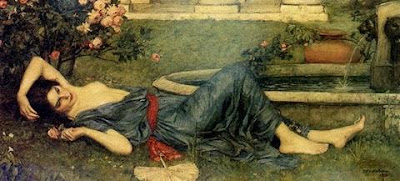 “In vain have I struggled. It will not do. My feelings will not be repressed. You must allow me to tell you how ardently I admire and love you.”… His sense of her inferiority — of its being a degradation — of the family obstacles which judgment had always opposed to inclination, were dwelt on with a warmth which seemed due to the consequence he was wounding, but was very unlikely to recommend his suit.
“In vain have I struggled. It will not do. My feelings will not be repressed. You must allow me to tell you how ardently I admire and love you.”… His sense of her inferiority — of its being a degradation — of the family obstacles which judgment had always opposed to inclination, were dwelt on with a warmth which seemed due to the consequence he was wounding, but was very unlikely to recommend his suit.
Darcy’s proposal to Elizabeth and although Jane Austen did not write romance, either by the standards of her time or ours, it has, I think the essence of what makes a romance work: that falling in love with this particular person is the worst possible thing that could happen. Love destroys and creates chaos; you can’t help yourself; you are powerless and there is no twelve-step group that can possibly help.
 I’ve always been fascinated by classical legends that have randy gods taking on nonhuman forms to seduce hapless mortals. Why bother with the disguise?–you’re a god, right? But is the disguise, other than the frisson of assuming another form, part of the divine insanity of love? I couldn’t help it, I was a swan with a brain the size of a walnut … One look at his lovely orange beak, that’s all it took …
I’ve always been fascinated by classical legends that have randy gods taking on nonhuman forms to seduce hapless mortals. Why bother with the disguise?–you’re a god, right? But is the disguise, other than the frisson of assuming another form, part of the divine insanity of love? I couldn’t help it, I was a swan with a brain the size of a walnut … One look at his lovely orange beak, that’s all it took …
My heroes and heroines find that their careful, sensible plans are overturned and their moral code and sense go out the window when they fall in love. Love = trouble, conflict, and after many adventures (a very useful phrase for synopses, by the way), acceptance of love and of each other.
What’s your definition of love in romance? Is it all you need?
Sign up for the Riskies newsletter at riskies@yahoo.com for advice on dealing with amorous waterfowl, with NEWSLETTER in the subject line.

and although Jane Austen did not write romance, either by the standards of her time or ours, it has, I think the essence of what makes a romance work
You don’t Austen wrote romance? I do. She wrote popular fiction with a central romance and a happily-ever-after ending.
I think Austen did write romance. Yet, her work is tinged with the reality of how “love” and “a good match” were defined within the societal context of the time.
Indeed, it is the very struggle of finding yourself in love with a person that does not fit your ideal of what your mate should be that srikes a chord within us. Even 200 years after originally written, many of us can relate to finding ourselves in this very situation…in love with somebody we did not imagine, yet good for us in ways we can hardly understand when we first met. Perhaps, this quality to her writing is what has made her work so loved?
I think Sir Walter Scott wrote romances as did Austen. In fact, a lot of fiction then had a central romantic theme.
Darcy’s proposal speech is just wonderful! Austen definitely wrote powerful love stories, with strong conflicts which have wonderful thematic echoes throughout the book, whether it’s the pride and prejudice and soical divide between Darcy and Elizabeth or the economics and honor that come between Elinor and Edward Ferrars or the persuasians of family and duty (and economics) that come between Anne and Frederick Wentworth. I think to me, a strong conflict is one of the key things in making a love story work in a novel or a play or a movie.
Darcy’s proposal speech is just wonderful!
One of the many (many!) reasons I dislike the latest version of P&P was the fact that they messed around with this very key piece of dialogue (and let us just say what they did was NOT an improvement!).
Oh La!
The scene worked for me. Red-rimmed eyes, almost-kiss, cliche’ rainstorm and all.
Not an improvement,(is improvement possible?) not terribly accurate, but another flavor. I thought it tasty if not tasteful.
Speaking of which, Thank you Kalen, for helping me with ideas for my thrift-store dress for the Beau Monde Soiree. It’s coming along. I’ll be about as period as a Twinkie, but hopefully a lot more tasteful,(tasty?).